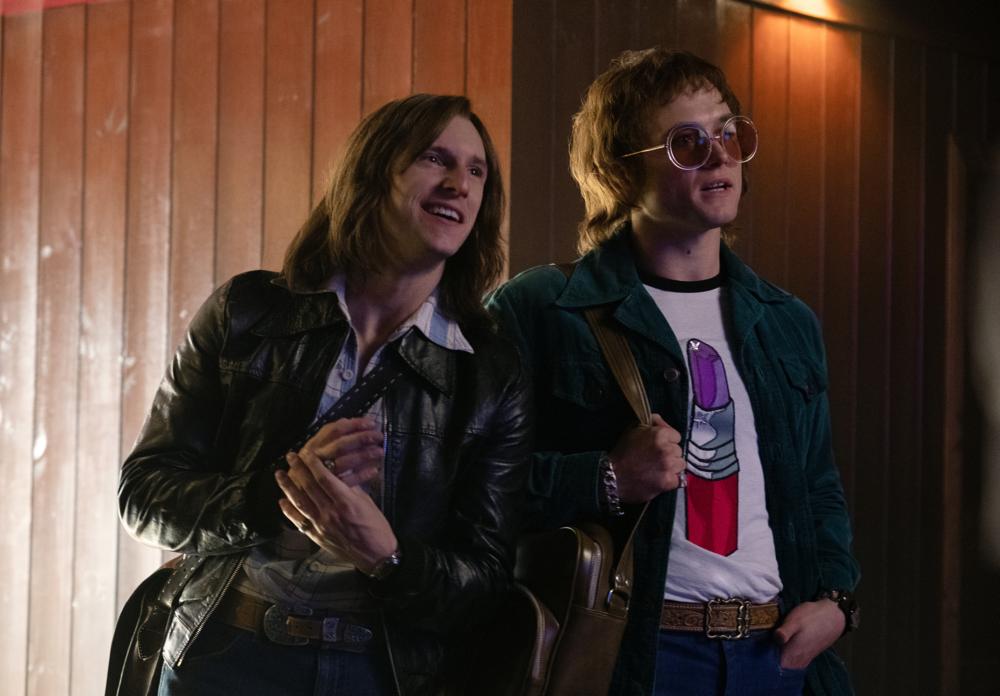 |
|
This film blurs the lines of fantasy and reality,
fuses the worlds of music, fame and fashion, and stamps a
glittery platform heel down on the cinematic rulebook. ROCKETMAN
takes audiences on an uncensored journey through the life of an
icon, with Elton’s most beloved songs – reimagined and updated
in breakthrough musical and dramatic performances by the young
cast – propelling and shaping the story. “The idea,” says its
director, Dexter Fletcher, “was to create something that would
genuinely explode off the screen, a riotous joy-ride of
imagination, celebration and drama.”
In ROCKETMAN, Elton John is played by Taron Egerton, delivering
an astonishing performance that has seen him record new versions
of some of John’s most famous songs. As the film follows Elton
from his English hometown of Pinner and along the yellow brick
road of fame, addiction and heartbreak, we will also meet the
mother he had a troubled relationship with (Bryce Dallas
Howard), his manager and onetime lover, John Reid (Richard
Madden), and his legendary lyricist Bernie Taupin (Jamie Bell),
the best friend and creative partner of over 50 years without
whom John might not have survived. As Elton, who gave the cast
and crew of ROCKETMAN free reign to tell his story, says: “My
life has been pretty crazy. The lows were very low, the highs
were very high. Unfortunately, there wasn’t much balance in
between.”
|
|
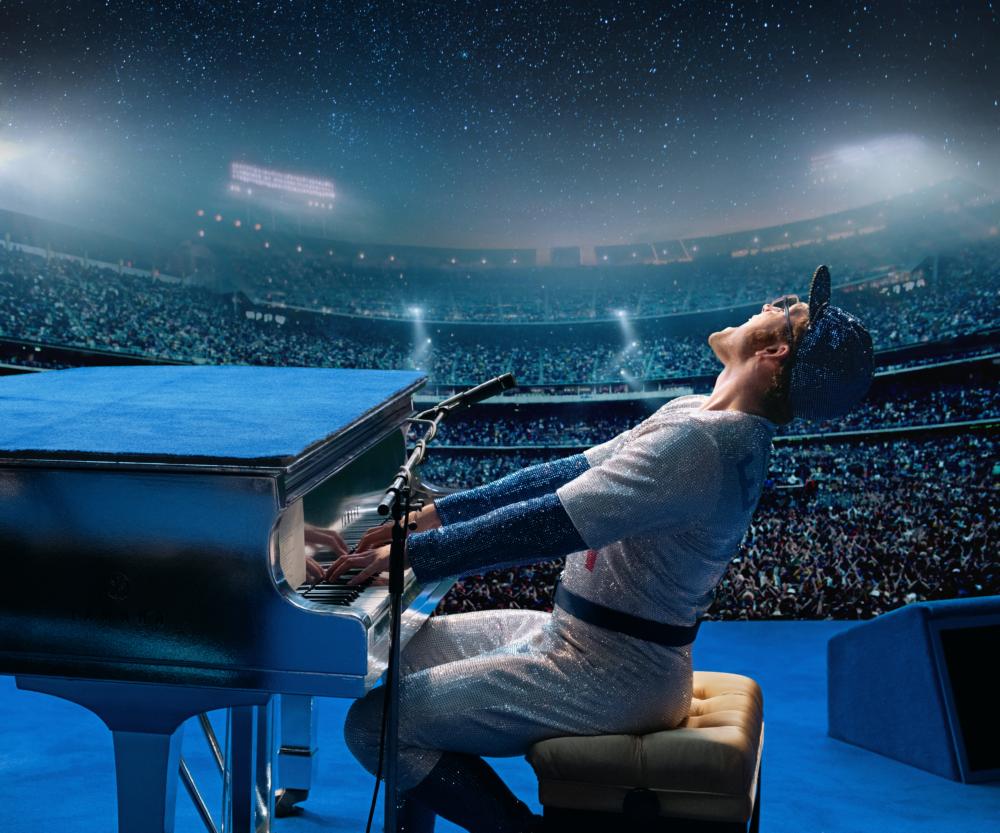 |
| |
|
For producer David Furnish, he knew from the beginning that
Elton John was interested in telling a fantasy version of his
life, something that was larger than life, not as it happened
exactly, but as the fantastical version of what might have taken
place. “And that was our starting point for the film that we
wanted to make.”The first Elton John track that features in
ROCKETMAN isn’t just thematically daring but sets the scene for
how music will be employed in telling the story of how young
Reggie became a global icon. “’The Bitch is Back’ is really
where we sign the contract with the audience and they get to
understand how the music is going to be applied throughout the
film,” says Furnish.
“It’s a bold opening for a film, a stand-up musical showpiece
kind of number, but it's also very important because it's where
we introduce the concept of our storytelling – that we aren't
just a live performance music movie, but a film where reality
and fantasy are very much blurred worlds that cross over at
different times. In ROCKETMAN, the music is often the conduit to
go in and out of those worlds, and to give people a chance to
express and reveal things about themselves through a song.”
‘The Bitch is Back’
The song transports us back to the 1950s, specifically the home
of a seven-year-old Reginald Dwight, where we find a family
living a largely loveless existence (“every member of the house
is searching for love in a different way,” observes Furnish).
The setting is sweet, “almost Stepford Wives-y,” says Fletcher,
a very traditional English setting in the ‘50s – all milkmen and
postmen and ice cream vans. “But everything is a bit too perfect,”
adds Fletcher. “I wanted all the dancers to be doll-faced and
have locked, rictus grins on their faces. The neighbors are all
very cheery and everyone’s waving to Reggie, and then he sings
about being ‘a bitch’ and he’s like this kind of venal,
dangerous character. Then you have older Elton in his devilish
costume in the middle of that, trying to stop it, close it down.
As
an opening salvo, ‘The Bitch is Back’ functions as the perfect
introduction to the world of ROCKETMAN, its daring mix of the
authentic and the surreal. “That’s the idea,” says Fletcher.
“You know, this isn’t traditional. We are in a musical, but it’s
weird and off-kilter, because that’s where Elton is at this
point (in the movie). He’s out of whack. Placing this opening in
his home in Pinner, where he’s from, where his genesis is, is
crucial. Later in his life, Elton got to the point where he
always felt he was bad, but the truth is, he wasn’t. He was once
just a wonderful, innocent child, like we all were. That’s what
he needs to reconnect with.”
‘Saturday Night’s Alright for Fighting’
One of ROCKETMAN’s most audacious set-pieces takes place,
somewhat appropriately, to one of Elton John’s most outrageously
thumping tunes. The sequence starts with a 10-year-old Reggie
playing piano in a London pub, before following him out the door,
up an alley and out into a bustling British funfair, where he
morphs from his young incarnation (played by Kit Connor) into
Taron Egerton’s tearaway teen.
It’s an astounding sequence, one single tracking shot following
him through the fairground as he interacts with over 300 extras,
50 dancers, four cameras, three cranes, 10 dodgems and a Ferris
wheel. This epic dance number took 12 weeks to choreograph and
time-jumps the audience from the ‘50s to the ‘60s. “And that
jump means we can also show all the different cultures and
influences in London at the time,” says choreographer Adam
Murray. “Each group (of dancers in the sequence) starts picking
up dance moves from the other groups – the Mods are doing a bit
of Bhangra and there are also Teddies, Rockers and Ska – this
unity.”
 |
|
|
Taron Egerton
as Elton John in 'Rocketman'
|
|
This narrative device and choice of song, says Furnish, “is a
brilliant metaphor for showing how Elton moved through a very
difficult, claustrophobic, working-class upbringing, to become
this unstoppable force propelling himself forward from childhood
into early manhood. It's a wonderful, big celebratory set-piece.”
Fletcher looks back on the shooting of the sequence –
comfortably his biggest to date – with pride. “‘Saturday Night’s
Alright for Fighting’ always makes people smile,” he says. “I
hope people come out of that scene and say, ‘Well, that was
great!’ There is so much storytelling crammed into it. Here,
Elton is seeing the things that are the genesis of his musical
influences. The sequence shows how Elton celebrates other people
and their differences because that is part of who he is and what
his ethos is. The world is now about celebrating diversity and
difference, and that is who Elton is. As a musical number, it’s
always moving, celebrating a raw, visceral youth. That’s why
it’s one shot. I said to my director of photography, George
Richmond, ‘Let’s make it connective, one shot. Let’s make it
keep moving, keep it fluid and do it seamlessly.’ And George is
the best man in the world for that job. That’s why it’s a key
centerpiece because it is really about Elton stepping out into a
wider world.”
‘Your Song’
This song will always be an essential feature on the soundtrack
to Taron Egerton’s life. You could even say that it’s the song
that changed it forever. Egerton chose the song as the one he
would perform at his audition to get into the Royal Academy of
Dramatic Arts. Twice. “The first time, I didn’t get in!” he
laughs now. “But I knew it was a winner and it worked the next
year. I chose it because it tells a story of a character. It’s
addressed to someone and you can perform it as a speech. And
it’s a truly lovely moment in ROCKETMAN, part of a narrative of
how Elton and Bernie collaborated in such a unique way.”
For Bell, it’s not just one of the greatest songs ever written
but perfect for the story they are telling. “It’s very visual
and cinematic songwriting,” he says. “The way that song is
depicted in the film is a beautiful, beautiful moment.”
As
for one of the two men who wrote it, ‘Your Song’ still remains
one of his most favourite to perform, nearly 50 years after he
first did. “I’ve never got tired of singing it,” says John.
“It’s the most beautiful, romantic song. It touches people.
That’s why you write songs, to touch people. You want to write
songs that please you, but if they please other people, and I
think the lyric to ‘Your Song’ and the sentiment behind the song
does, it will never die. It’s an extraordinary lyric from an
18-year-old poet (Bernie Taupin). And it’s complicated – I wrote
it in E-flat, and I wrote it very, very quickly as you see in
ROCKETMAN. That really is how it happened. The writing was a
magical moment in our life.”
That scene in ROCKETMAN, as we witness the creation of one of
the most enduring love songs of all time, is, according to its
director, one of the most stunning moments in a movie packed
with them. “What I set out to do was to use the songs in a new
and exciting way,” says Fletcher. “The familiarity of the song
allows us to enjoy that moment and what we’ve done with it is a
spine-tingling cinematic moment.”
‘Crocodile Rock’
“One of the bits I'm most proud of in our film is Elton’s
breakout performance at the Troubadour,” says Egerton of the
moment that Elton John first burst onto the global music scene.
“He was 23 years old and it was one of those performances, one
of those amazing nights at the Troubadour, that really broke him
into this a huge international artist.”
|
|
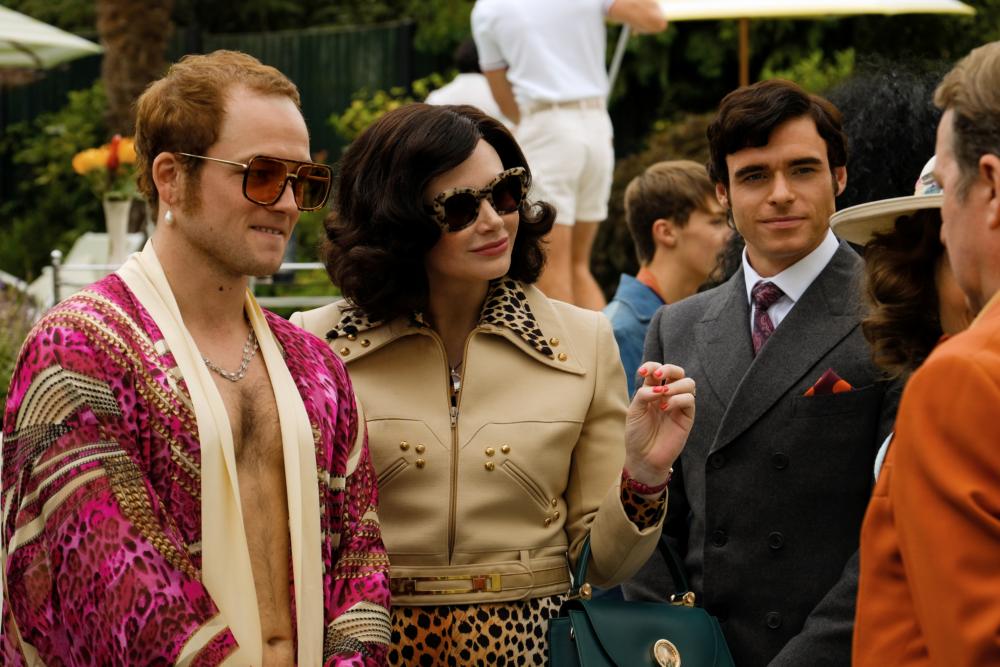 |
The production built a note-perfect recreation of the iconic
music venue in Los Angeles, for a sequence that sees Egerton’s
John go from terrified – hiding in the toilets backstage,
refusing to come on – to triumphant. “‘Crocodile Rock’ is one of
Elton's biggest audience participation numbers, so that seemed
like an obvious choice for the sequence,” says Furnish. “It's so
catchy, you pick it up so quickly, people sing along with it
straight away. And in the movie, there is a light, airy quality
to what Dexter has imagined with the Troubadour performance.
Elton was always famous for projecting his legs up in the air
off the back of the pianos, doing handstands on the piano keys.
We decided to take that and use that as a metaphor for showing
his rise to fame. During that number, with all the energy and
all the kicking back, his legs rise up into the air and the
audience rises up into the air with him. You get the sense that
it's not just your average concert, it's a very, very special
moment where the whole room kind of felt like things just went
to another place in a big otherworldly kind of way. That song
underpins all of that beautifully.”
Not that it necessarily felt like it at the time, of course.
“People just went, ‘What?’” laughs John at the memory of that
memorable night. “I was, you know, jumping in the air and all
that, and they weren’t ready for that. But it was about being in
the right place at the right time. You know, when Dick James (the
British record producer) said to me, ‘I want you to go to the
Troubadour,’ I said to him, ‘I so want to go to America but I
don’t think the time is right.’ He told me I had to go. It shows
you; you know nothing. I thought, ‘Well, I want to go to an
American record store and buy some albums.’ So, I went. You
never know what’s going happen!”
‘Tiny Dancer’
That unforgettable, life-changing night at The Troubadour became
ever more significant for what happened right after it, with
John and Taupin finding themselves invited straight afterwards
to a party at music icon Mama Cass’ house. It was there that
Elton first met John Reid.
“In the movie you really see the instant connection between
these two men,” says Madden. “Their relationship would get much
more complicated and go to some dark places, but it was
important to us to show how intense that spark first was.”
And what better song to showcase that spark than ‘Tiny Dancer’,
one of John’s most beloved songs? “Absolutely,” says Fletcher.
“You know, when we started to make the movie, we obviously
started to think about what songs we were going to feature in
it. There are so many Elton John songs to choose from, and, to
be clear, we chose the songs we have in the movie because they
worked with the story that we wanted to tell. But, when you
start writing that list, ‘Tiny Dancer’ is basically right at the
top of it.”
‘Honky Cat’
Like the ‘Saturday Night’s Alright for Fighting’ sequence,
ROCKETMAN’s ‘Honky Cat’ one is also deliberately staged with the
look and feel of a classic MGM musical. And not just for the
visual pizzazz of it, either. “This short sequence is
illustrating the kind of burgeoning success and growing
notoriety and wealth that is coming to Elton at that time,”
explains Egerton. “The fun of the number is that Elton is really
discovering his identity before the cost of excess kicks in. In
it, me and Richard (Madden) have a little dance-off on top of a
huge spinning record.”
It’s a lovely, brief but telling moment in the movie; one that
feels both modern in its execution and classical in its make-up.
“Singin’ in the Rain is one of my favorite films, where Gene
Kelly and Cyd Charisse go off into these inspired fantasies,”
says Fletcher of the tone he’s striving for. “For me, the
question is how we take that traditional thing and flip it on
its head and make it all about opulence and self-indulgence and
behavior that is deemed to be not particularly attractive – the
spending of money.”
And, boy, was there money. At the time of the ‘Honky Cat’
sequence in ROCKETMAN, Elton John was commanding no less than 4
percent
of all records sold, everywhere. “That is a a tremendous amount
of money,” says Fletcher. “So, the song needed to celebrate and
look at that, take it on board. Whether you agree with it or not,
it is Elton’s reality at that point, and while it seems
fantastical and opulent and almost rude, ‘Honky Cat’ just seemed
to lean into that idea nicely. It shows the side of, ‘It must be
wonderful to be rich and have a bath of champagne,’ but while
it’s an exploration of that, it’s also about the other side of
that. It’s the beginning of his detachment from reality.”
|
|
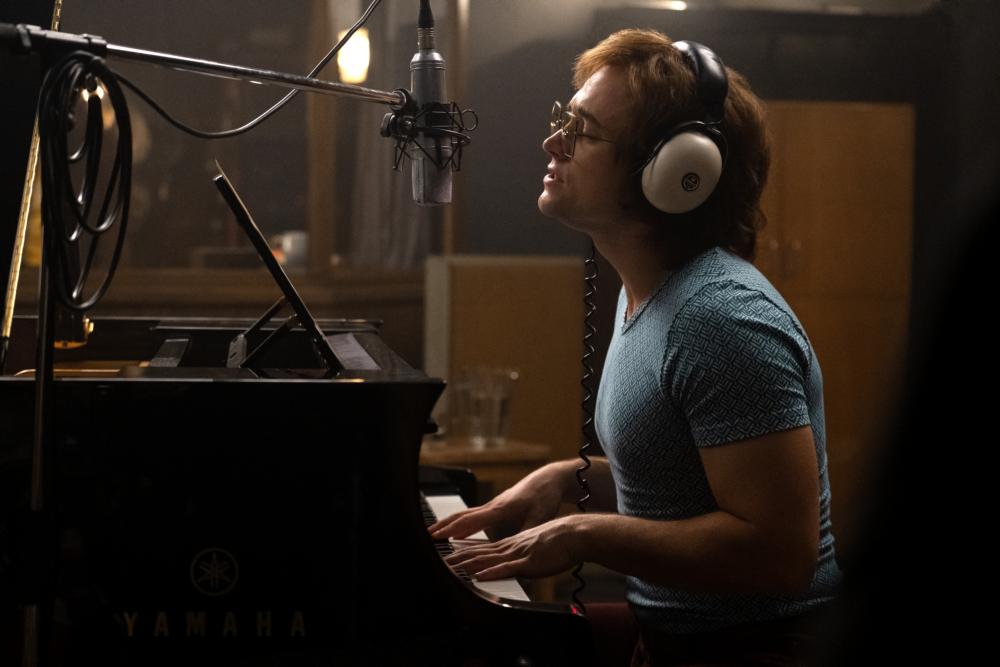 |
| |
|
One of ROCKETMAN’s very first manifestos was always that as well
as celebrating the life of Elton John, it would not shy away
from the darkness that it has also seen. And this ‘Honky Cat’
sequence is a prime example of that, of John’s commitment to
authenticity, even the ugly side of it. “That was always
important to us,” acknowledges Furnish. “This song is used in
the moment in our storytelling where Elton is becoming this big,
big success, but where he kind of goes from there. It starts to
show the influence that John Reid has on his life and the things
he introduces Elton to. It shows how they come together as a
couple and come together as a business and learn and grow so
much. It's really where the excesses start to come into Elton's
life, and he begins to really broaden as an individual. Which is
a good thing but also, turns out to be a very, very challenging
thing in his life. ‘Honky Cat’ is a very seductive moment in the
film.”
‘Bennie and the Jets’
For ROCKETMAN’s music producer, the Giles Martin, ‘Bennie and
the Jets’ is maybe the boldest of all the many musical
interpretations that this production has brought to bear on
Elton John’s classic back catalogue.
It’s a wild take for a wild time in the movie’s narrative. “It’s
the bacchanalian reality, it’s the private jet going down to the
NYC wonderland,” says Fletcher of the sequence. “It’s the high
point or the low point in the story, depending on your viewpoint.
In ROCKETMAN, there had to be a time where Elton completely
loses himself, loses his way. Then he comes into rehab to try to
find who he is again. I can’t do ‘warts and all’ if I don’t show
the warts. And this is really what it looked like.
This was a question of, ‘How dark can we make it?’ I didn’t need
to show Elton sleeping with loads of people in the film and all
that stuff, but I needed people to understand what propelled his
behavior. We have honest love scenes of Richard and Taron, and
they’re beautifully shot, like any love scene should be. But
‘Bennie and the Jets’ is the polar opposite of that, where his
life just becomes completely venal and lost. The film has a
responsibility to explore that. And, if I don’t, then I can’t
put him in rehab. He’s got nothing to rehabilitate from.”
The track, sung by Egerton, is set in a nightclub, and not just
any club. “There was a period in the ‘70s where Studio 54 was
the club to be at,” says Fletcher. “It was an incredible place
for incredible people with an incredible creative output, but it
was a particularly dark time. It was this strange time when AIDS
was very prevalent. There was this undertone of fear. Elton’s
personal life was getting completely lost in addiction. So, in
the ‘Bennie and the Jets’ sequence, there is this kind of
darkness and you see the seven layers of Hell as you descend
down into the club. The film takes a responsible attitude to the
drugs in that it goes, ‘Yeah, come to Studio 54. It’s amazing as
you come down the stairs, but once you get to the bottom, it’s
horrible – the people who are there are lost.’ So, visually, the
sequence starts off and looks and feels amazing. It’s very
inviting. But then it descends into a darkness that I feel is
the responsible way to approach it, because I don’t want to
glorify it. There is a human cost, an emotional cost and a
personal cost.”
As costume designer Julian Day has it, “If ‘Honky Cat’ is the
seed of excess then ‘Bennie and the Jets’ is the finished oak of
things.” It’s sex and drugs, in other words, but the rock and
roll has gone out the window. “This is when the rocket is really
starting to sputter,” says Furnish. “‘Bennie and the Jets’ is
where Elton is really on the decline. Everything is becoming too
much. His addictions are spiraling out of control and dragging
him down. The song is used as almost this desperate cry. It's
very powerfully used.”
‘Goodbye Yellow Brick Road’
As well as being a classic song and a pivotal part of the story
in the movie, ‘Goodbye Yellow Brick Road’ is also the perfect
showcase of the brilliant intricacies that costume designer
Julian Day brought to ROCKETMAN. The outfit he created to
accompany the song is inspired, of course, by The Wizard of Oz,
with the kind of level of detailing that will delight fans of
the family classic.
“It’s one of my favorite outfits in the movie,” says Day. “I
gave Taron a blue suit with ruby-red shoes on and ruby-red
lapels, to represent Dorothy. The shirt is made of silver fabric,
for the Tin Man. He’s got a straw hat, for the Scarecrow, and a
big fake fur coat for the Lion. There’s even a little emerald
belt buckle, and Taron wore a small emerald earring, to
represent the Emerald City.”
But, while it’s Egerton’s outfit, it’s Bell’s song to sing. “I
get to sing ‘Goodbye Yellow Brick Road’ at a point where Bernie
and Elton have been apart for a time, and Bernie has come to
check in on Elton,” says Bell. “Elton is just spinning, off the
planet. He’s drinking a lot and has just turned mean. He’s lost
himself and is so far removed from who he is. Even when he’s
looking at Bernie, his steadfast friend, he can’t even see the
forest for the trees anymore.”
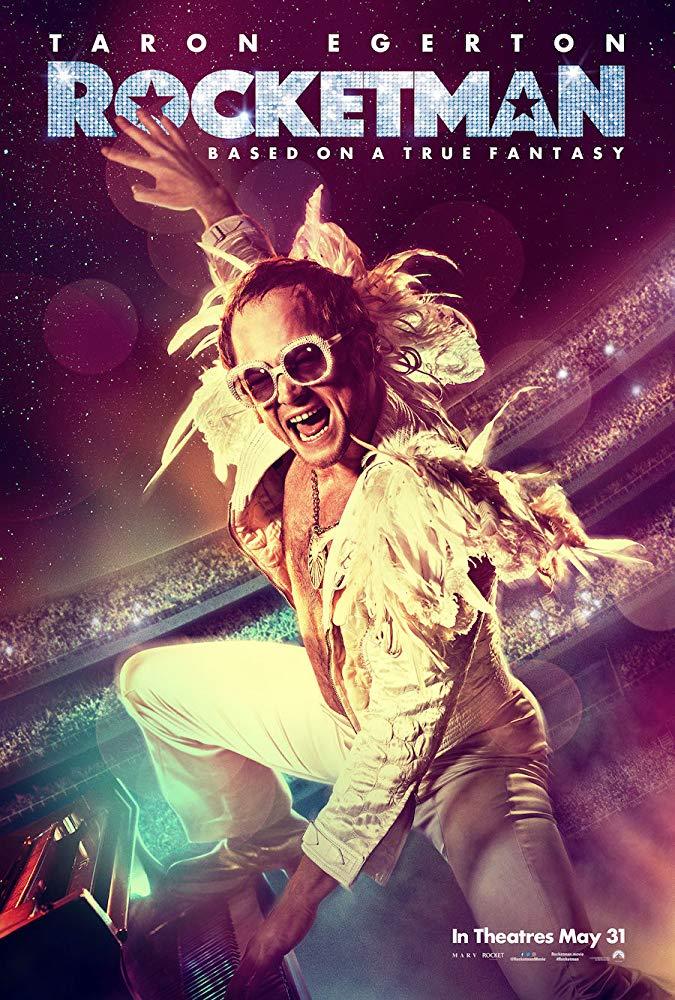 |
|
|
Filmposter
|
|
The scene sees the pair meet in a fancy restaurant, for a dinner
that will go disastrously. “There’s this beat where the music
kicks in,” says Bell, “and the lyrics are, ‘When are you going
to come down? When are you going to land?’ So, basically, Bernie
is saying to Elton, ‘When are you going to get off this roller
coaster? When is it going to stop? When are you going to face up
to the fact that you have some issues and that you have to deal
with them, before they kill you?’ Bernie storms out of the
restaurant as he’s singing and it’s really the moment where we
know – oh, wow – this relationship is coming to an end. And it’s
sad. Bernie gets in a cab and drives away and there is a feeling
of tragedy that the song allows. It’s a moment where Bernie
thinks, ‘I’ve tried to save my friend, and I don’t think I can.’
The song expresses a failure for him in some ways.”
What is the Yellow Brick Road? What does it represent? Is it the
entertainment industry as a whole, or Taupin and John’s careers
within it? “It can mean different things to different people,”
reasons Bell. “The storytelling moment here is that Elton and
Bernie both wanted to do something important with their lives,
to change their circumstances. We can all connect with that in
some way. When you get the thing you want, it can be very
complicated. And how you deal with it can be complicated. And
then, what if you lose the one thing that kind of keeps you
grounded? Then, all bets are off...”
‘Rocket Man’
Appropriately, given that it is ROCKETMAN’s title track, the
moment that the song that drives the movie arrives is one for
the ages. As Martin himself says of the achievement, “The song
‘Rocket Man’ starts in the bottom of a swimming pool and ends up
in a stadium. I guess that’s a bold statement.”
“You don’t really think of ‘Rocket Man’ as being a stadium song.
But we’ve kind of thrown the kitchen sink at it,” says Martin.
“There’s a 50-piece choir and a 100-piece orchestra on it. It’s
become this huge thing. And we haven’t done these things for the
sake of doing these things. We’ve done them for the sake of it
being fun, a good listen and good to watch. Ultimately, I don’t
think we get points for bravery, I think we get points for
entertainment.”
Fletcher marvels at the memory of making the moment. In the
movie, it’s a sequence where Egerton’s John, depressed and
having taken an overdose, plunges himself into a swimming pool
at a party. Which is great to read on paper, but quite something
else to execute in reality. “Put it this way,” says Fletcher. “I
am extremely proud of Taron being able to perform a song on his
back, at the bottom of a 15-meter water tank. It really is
something to behold.”
'Flet'
For Furnish, ’Rocket Man’ is the ideal metaphor for a man at the
peak of his powers, who has never felt more alone. “At that time
in his life, Elton was the biggest star in the world,” says the
producer. “His rocket was fully in ascension and he was orbiting
through the universe, but he was also feeling increasingly
isolated and incredibly lonely and starting to feel really
detached from everyday life. Real love and real connection were
becoming harder and hrder and more elusive for him. And this
song, melodically and lyrically, captures that feeling so well.
It fits because it's got all the anthemic qualities of that big
moment in his life, but it also has the dramatic isolation that
Elton can sometimes feel, despite all the success and everything
that's happening around him. Basically, it’s the perfect mix of
music and movie. I can’t wait for people to see it.”